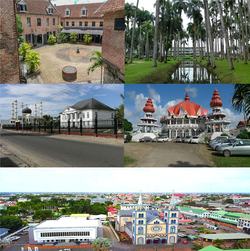 | |
| Currency | Surinamese dollar (SRD) (since 2004) Surinamese guilder (SRG) (until 2003) |
|---|---|
| Calendar year | |
Trade organisations | WTO, CARICOM, Unasur, Mercosur (associate) |
| Statistics | |
| Population | |
| GDP | |
| GDP rank | |
GDP growth | |
GDP per capita | |
GDP per capita rank | |
GDP by sector | agriculture: 10.4%; industry: 36.6%; services: 52.9% (2012 est.) |
| 22 % (2020) [3] | |
Population below poverty line | 70% (2002 est.) |
Labour force | 220,600 (2020) [6] |
Labour force by occupation | agriculture: 8%; industry: 14%; services: 78% (2004) |
| Unemployment | 7.47% (2020) [7] |
Main industries | bauxite and gold mining, alumina production; oil, lumbering, food processing, fishing |
| External | |
| Exports | |
Export goods | Gold, alumina, Wood, crude oil, lumber, shrimp and fish, rice, bananas |
Main export partners |
|
| Imports | |
Import goods | capital equipment, petroleum, foodstuffs, cotton, consumer goods |
Main import partners |
|
Gross external debt | $504.3 million (2005 est.) |
| Public finances | |
| $647.3 million (2019) [10] | |
| Revenues | $826.6 million (2010 est.) |
| Expenses | $939.7 million (2010 est.) |
| Economic aid | Netherlands provided $37 million for project and program assistance, European Development Fund $4 million, Belgium $2 million (2003) |
| Standard & Poor's:CCC Outlook: Stable [11] Moody's: [11] Caa2 Outlook: Stable Fitch: [11] CCC Outlook: Highly Vulnerable | |
All values, unless otherwise stated, are in US dollars. | |
The economy of Suriname was largely dependent upon the exports of aluminium oxide and small amounts of aluminium produced from bauxite mined in the country. However, after the departure of Alcoa, the economy depended on the exports of crude oil and gold. Suriname was ranked the 124th safest investment destination in the world in the March 2011 Euromoney Country Risk rankings. [12]
